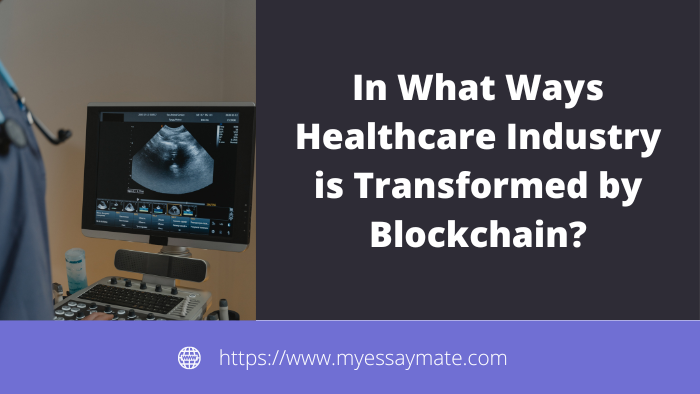
September 30, 2022
In What Ways Healthcare Industry is Transformed by Blockchain?
No 1 Assignment Help
is only a click away.
In What Ways Healthcare Industry is Transformed by Blockchain?
A significant paradigm change in the healthcare industry has occurred with the
These developments have made patient treatment more straightforward, shifting the focus to a patient-centric strategy. But this upheaval is being sparked by a cutting-edge technology that will further transform healthcare as we currently know it. Says the Nursing care plan assignment help experts.
What is blockchain?
A blockchain is a digitalized public record that contains blocks of a wide variety of data and is linked to bitcoin transactions. The blockchain's consensus methods and cryptographic principles guarantee security and a consistent ledger. Asymmetric cryptography, however, significantly hampered the ability of connected database systems to share data records.
Blockchain technology's associated decentralisation of transactions, anonymity, continuity, and audibility are its key distinguishing characteristics. Simply said, until it reaches the destination, data using blockchain technology cannot be recognised or altered.
The financial services sector has reaped the most rewards from this ground-breaking technology, and according to a Silicon Republic research, banks that embrace blockchain technology can save up to $12 billion yearly.
As stakeholders start to take advantage of the immense advantages of blockchain and distributed ledger technology in healthcare, the healthcare sector is not adopting a passive position in this technological revolution.
What is block chain technology?
Block chain technology is an exciting technology that has impressed millions of healthcare providers and biochemical scientists. In various healthcare domains, it has touched the longitude of areas such as healthcare records, consumer health, patient portals, drug development, medical research, data security, and minimising the cost of supply chain management. However, it is still being observed as to how it will be beneficial for the healthcare industry. And for that, the potential of prospective concepts such as patient IDs is being monitored.
However, the adoption of block chain in various healthcare domains will explore many possibilities that make a robust healthcare system.
Significance of block chain adoption in healthcare
Here are the top components of block chain adoption in healthcare explained by the experts of aged care plan assignment help:
Healthcare data exchange
The healthcare industry has a top priority on its interoperability gaps. Therefore, the current industry stats have significantly revealed the current centralised IT systems in the healthcare exchange.
The recent data shows blockchain technology services employ an estimated number of 150,000 people with a cost of $18.6 billion globally each year.
Moreover, blockchain technology secures a decentralised system associated with health data exchange that protects and helps authenticate health data. Besides this, blockchain reduces the burden of data reconciliation by enabling easy availability of real-time information.
Blockchain technology in the healthcare industry is used in data security, auditability, and transparency at all levels of healthcare.
Drug Traceability and Clinical Trials
Statistics show that pharmaceutical businesses worldwide suffer losses related to counterfeit pharmaceuticals of up to $200 billion each year. It is estimated that more than one-third of medicines sold in underdeveloped nations are fake. By producing a chain-of-custody log and employing AI-based add-ons to produce proof-of-ownership data for medications, Blockchain technology can remove obstacles to supply chain tracking.
A blockchain-based technology for drug traceability and clinical trials for the supply chain presents the initial attempts.
Even though the whole solution has many similarities, there are still efforts focusing on pharmaceutical supply chain management.
In addition to this, the blockchains take a holistic approach that identifies and involves significant stakeholders of the drug supply chain supplier, manufacturer,
Blockchain technology in the healthcare sector minimises the chances of errors and fraudulent activities in the clinical records of patients. In this step, the technology provides immutable records of clinical trials.
In addition, blockchain-enabled technology can address outcomes for switching and selective reporting in clinical trials.
They discovered that by identifying a hash that the system generates for each update made to the data, they could determine whether the data of a clinical study had been altered by using a unique code generated by the Blockchain system.
Cyber security
Health data security is increasing as a result of the increasing number of patients receiving care. Experts predict that by 2020 there will be more than 20 billion healthcare professionals using IoT connection devices. Due to extreme data protection, this results in an increase in the amount of patient health information.
Blockchain technology can straddle the line between interoperability and data privacy. The use of the Internet of Medical Things (IoMT) is confidential thanks to this method.
By securing data with the public blockchain, which enables the establishment of proof of data security, blockchain technology is the tool for safeguarding information technology.
Without a question, the disruptive breakthrough that spans several industries is blockchain technology. Healthcare stakeholders are similarly excited about the possibilities offered by blockchain technology and have made significant investments in distributed ledger technologies to support the development of more effective healthcare systems.
Enhanced medical research processes via blockchain
The COVID-19 pandemic had a significant impact on the healthcare industry, but little is known about how it affected clinical research studies and other types of medical research, suggests the Nursing care plan assignment help experts. Clinical trials serve as the foundation for the development of new drugs, treatments, and cures for terminal diseases.
The pharmaceutical industry is leading the way in the use of blockchain-based technologies in medical research, particularly as a way to improve the effectiveness of clinical trials for innovative pharmaceuticals. The built-in security of blockchain ensures that the data cannot be altered or accessed by unauthorised parties. Authorized stakeholders may easily obtain trial findings thanks to the public registries created by blockchain.
Blockchain facilitates collaboration between healthcare and research organisations, which improves drug discovery and development.
By prohibiting the exploitation of participants' research, blockchain security safeguards their intellectual property rights.
What is the future of Healthcare Management with Block chain?
Healthcare block chain offers some excellent opportunities for the sector's advancement. The viability, desirability, and variety of services made available by such systems are the main determinants of the same. Integrating healthcare informatics is possible with this technology. They are suited to efficiently manage the enormous healthcare data, given the flexibility to meet the industry's difficulties.
Finally, blockchain technology makes the most of the little data that is collected. It expedites the healthcare process. With the help of extra capabilities like machine learning (ML) and artificial intelligence, healthcare providers can concentrate entirely on the current diagnosis and treatment tasks (AI). Blockchain and artificial intelligence work well together and are the future of medicine.
Most Australians use public healthcare, funded by taxes and provided for free or at minimal cost by the federal and state governments. Therefore, using blockchain to manage a large number of patients is compelling. This technology connects the medical and insurance records of the patient. They are making it more detailed for the hospital and the patient to deliver high-quality medical treatment.
You have to do assignments, case studies, research projects, clinical reflection essays, and more as a nursing student. Fill out the form to receive the greatest Assignment help Australia at very reasonable costs if you are having trouble locating the appropriate resources.
Related Blogs
Subscribe Our Newsletter & get Information about latest courses









